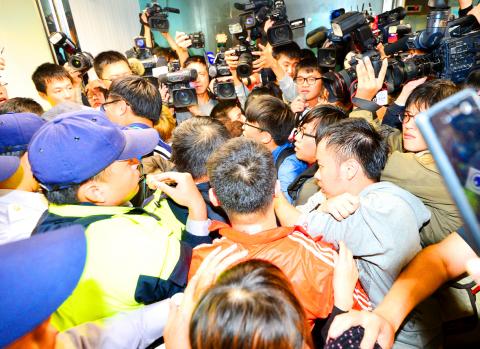Students stormed Democratic Progressive Party (DPP) headquarters in Taipei yesterday, escalating a protest over controversial amendments to the Labor Standards Act (勞動基準法).
About 20 students from groups affiliated with the Workers’ Struggle Alliance scuffled with police guarding the glass doors lead to the DPP’s offices, shouting for President Tsai Ing-wen (蔡英文) to come out and face them over the party’s plan to cut the number of national holidays per year from 19 to 12.
The cuts would be implemented following the passage of a bill that is part of reforms to implement a 40-hour workweek, with a final vote possible as soon as next week after the expiration of a one-month waiting period imposed after cross-caucus negotiations.

Photo: Wang Yi-sung, Taipei Times
Protesters occupied a reception area at the DPP offices shortly after noon, prior to a meeting of the DPP Central Standing Committee, after reportedly failing to force their way down to a lower floor where the meeting was to be held.
They pasted slogans across foyer walls and doors, occasionally shouting slogans in between speeches.
“The main reason [for the occupation] is the response we received from [DPP caucus whip] Ker Chien-ming (柯建銘) yesterday [Tuesday] and the fact that we have protested in front of DPP headquarters many times, but have never received a response,” Taiwan Higher Education Union student action committee member Su Tzu-hsuan (蘇子軒) said.
Ker on Tuesday said he was only willing to discuss the amendments with other legislators, after protesters briefly occupied one of his offices at the Legislative Yuan to demand a public debate.
The protesters also criticized statements by Legislative Speaker Su Jia-chyuan (蘇嘉全), who said Tuesday’s occupation was unacceptable, as a legislator’s office constitutes “private space.”
“If offices were truly ‘private space,’ then Su as legislative speaker should not have issued an official condemnation and the fact that he did not shows that they at least partially belong to the public,” Su Tzu-hsuan said, threatening that the protesters would follow DPP members “like shadows” if they failed to respond.
“We have to draw a line between ourselves and this ‘capitalist’ party that is advancing the interests of the wealthy, meeting secretly with business groups and capitalists, rather than listening to young people,” he said.
The protesters occupied the foyer for about an hour before attempting to stage a retreat, only to be blocked briefly by police officers before they were allowed to quietly trickle into the elevators.
DPP officials reportedly asked the police to refrain from dragging the students out of the building.
Su said the protesters staged a voluntary retreat after it became apparent there was “absolutely no way” that they would meet with Tsai.
DPP spokesman Juan Chao-hsiung (阮昭雄) said the party respected the protesters’ opinions and their right to freedom of expression.
“We respect different opinions and believe these young people have fully expressed theirs,” Juan said when asked why no DPP officials tried to communicate with the protesters.
Tsai did not comment on the protest during the committee meeting, Juan said.
Additional reporting by Chen Wei-han

AIR SUPPORT: The Ministry of National Defense thanked the US for the delivery, adding that it was an indicator of the White House’s commitment to the Taiwan Relations Act Deputy Minister of National Defense Po Horng-huei (柏鴻輝) and Representative to the US Alexander Yui on Friday attended a delivery ceremony for the first of Taiwan’s long-awaited 66 F-16C/D Block 70 jets at a Lockheed Martin Corp factory in Greenville, South Carolina. “We are so proud to be the global home of the F-16 and to support Taiwan’s air defense capabilities,” US Representative William Timmons wrote on X, alongside a photograph of Taiwanese and US officials at the event. The F-16C/D Block 70 jets Taiwan ordered have the same capabilities as aircraft that had been upgraded to F-16Vs. The batch of Lockheed Martin

GRIDLOCK: The National Fire Agency’s Special Search and Rescue team is on standby to travel to the countries to help out with the rescue effort A powerful earthquake rocked Myanmar and neighboring Thailand yesterday, killing at least three people in Bangkok and burying dozens when a high-rise building under construction collapsed. Footage shared on social media from Myanmar’s second-largest city showed widespread destruction, raising fears that many were trapped under the rubble or killed. The magnitude 7.7 earthquake, with an epicenter near Mandalay in Myanmar, struck at midday and was followed by a strong magnitude 6.4 aftershock. The extent of death, injury and destruction — especially in Myanmar, which is embroiled in a civil war and where information is tightly controlled at the best of times —

China's military today said it began joint army, navy and rocket force exercises around Taiwan to "serve as a stern warning and powerful deterrent against Taiwanese independence," calling President William Lai (賴清德) a "parasite." The exercises come after Lai called Beijing a "foreign hostile force" last month. More than 10 Chinese military ships approached close to Taiwan's 24 nautical mile (44.4km) contiguous zone this morning and Taiwan sent its own warships to respond, two senior Taiwanese officials said. Taiwan has not yet detected any live fire by the Chinese military so far, one of the officials said. The drills took place after US Secretary

THUGGISH BEHAVIOR: Encouraging people to report independence supporters is another intimidation tactic that threatens cross-strait peace, the state department said China setting up an online system for reporting “Taiwanese independence” advocates is an “irresponsible and reprehensible” act, a US government spokesperson said on Friday. “China’s call for private individuals to report on alleged ‘persecution or suppression’ by supposed ‘Taiwan independence henchmen and accomplices’ is irresponsible and reprehensible,” an unnamed US Department of State spokesperson told the Central News Agency in an e-mail. The move is part of Beijing’s “intimidation campaign” against Taiwan and its supporters, and is “threatening free speech around the world, destabilizing the Indo-Pacific region, and deliberately eroding the cross-strait status quo,” the spokesperson said. The Chinese Communist Party’s “threats